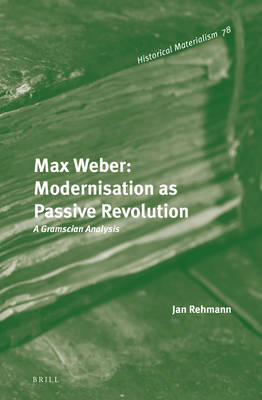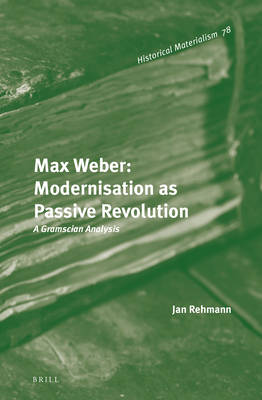
Je cadeautjes zeker op tijd in huis hebben voor de feestdagen? Kom langs in onze winkels en vind het perfecte geschenk!
- Afhalen na 1 uur in een winkel met voorraad
- Gratis thuislevering in België vanaf € 30
- Ruim aanbod met 7 miljoen producten
Je cadeautjes zeker op tijd in huis hebben voor de feestdagen? Kom langs in onze winkels en vind het perfecte geschenk!
- Afhalen na 1 uur in een winkel met voorraad
- Gratis thuislevering in België vanaf € 30
- Ruim aanbod met 7 miljoen producten
Zoeken
€ 315,95
+ 631 punten
Uitvoering
Omschrijving
Basing his research on Gramsci's theory of hegemony, Rehmann provides a comprehensive socio-analysis of Max Weber's political and intellectual position in the ideological network of his time. Max Weber: Modernisation as Passive Revolution shows that, even though Weber presents his science as 'value-free', he is best understood as an organic intellectual of the bourgeoisie, who has the mission of providing his class with an intense ethico-political education. Viewed as a whole, his writings present a new model for bourgeois hegemony in the transition to 'Fordism'. Weber is both a sharp critic of a 'passive revolution' in Germany tying the bourgeois class to the interests of the agrarian class, and a proponent of a more modern version of passive revolution, which would foreclose a socialist revolution by the construction of an industrial bloc consisting of the bourgeoisie and labour aristocracy.
(c) 1998 Argument Verlag GmbH, Hamburg. Translated from German "Max Weber: Modernisierung als passive Revolution. Kontextstudien zu Politik Philosophie und Religion im Übergang zum Fordismus".
(c) 1998 Argument Verlag GmbH, Hamburg. Translated from German "Max Weber: Modernisierung als passive Revolution. Kontextstudien zu Politik Philosophie und Religion im Übergang zum Fordismus".
Specificaties
Betrokkenen
- Auteur(s):
- Uitgeverij:
Inhoud
- Aantal bladzijden:
- 460
- Taal:
- Engels
- Reeks:
- Reeksnummer:
- nr. 78
Eigenschappen
- Productcode (EAN):
- 9789004271791
- Verschijningsdatum:
- 28/10/2014
- Uitvoering:
- Hardcover
- Formaat:
- Genaaid
- Afmetingen:
- 163 mm x 239 mm
- Gewicht:
- 839 g

Alleen bij Standaard Boekhandel
+ 631 punten op je klantenkaart van Standaard Boekhandel
Beoordelingen
We publiceren alleen reviews die voldoen aan de voorwaarden voor reviews. Bekijk onze voorwaarden voor reviews.









